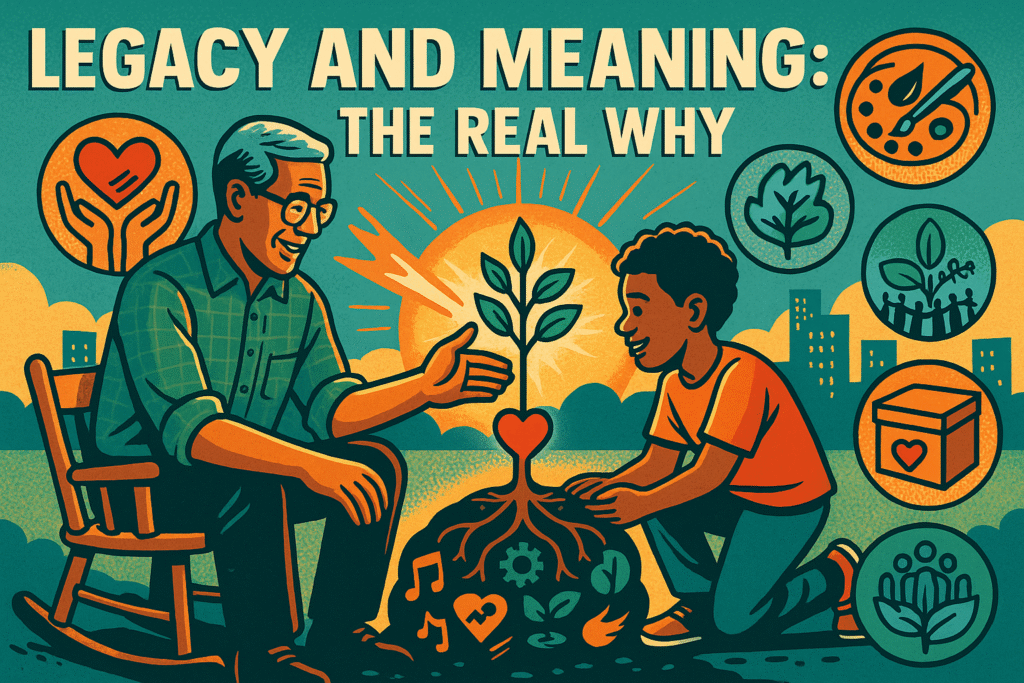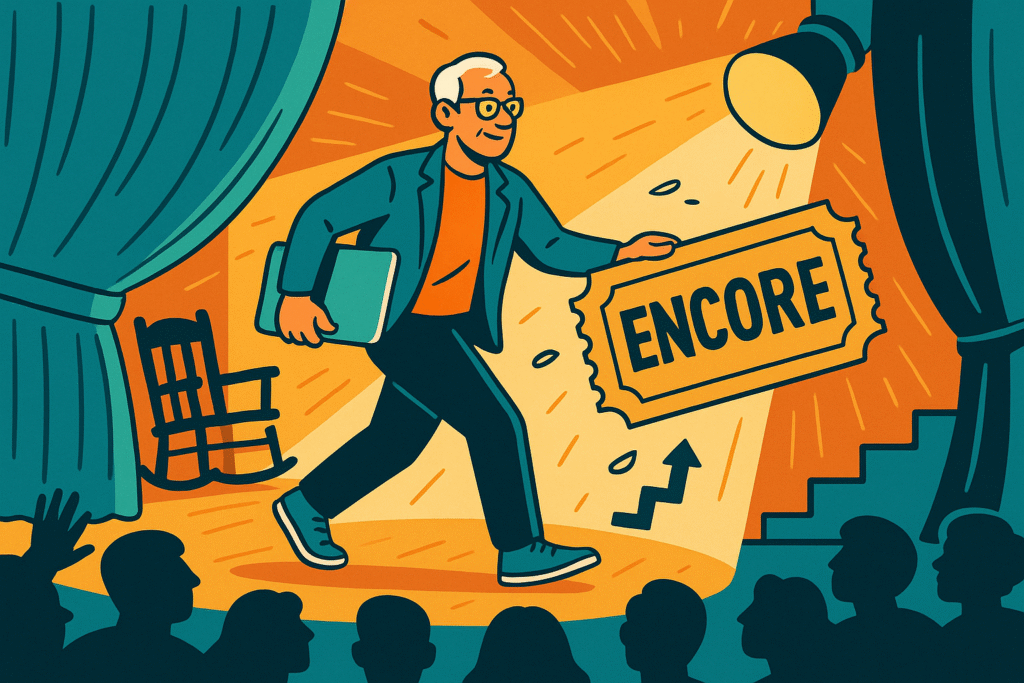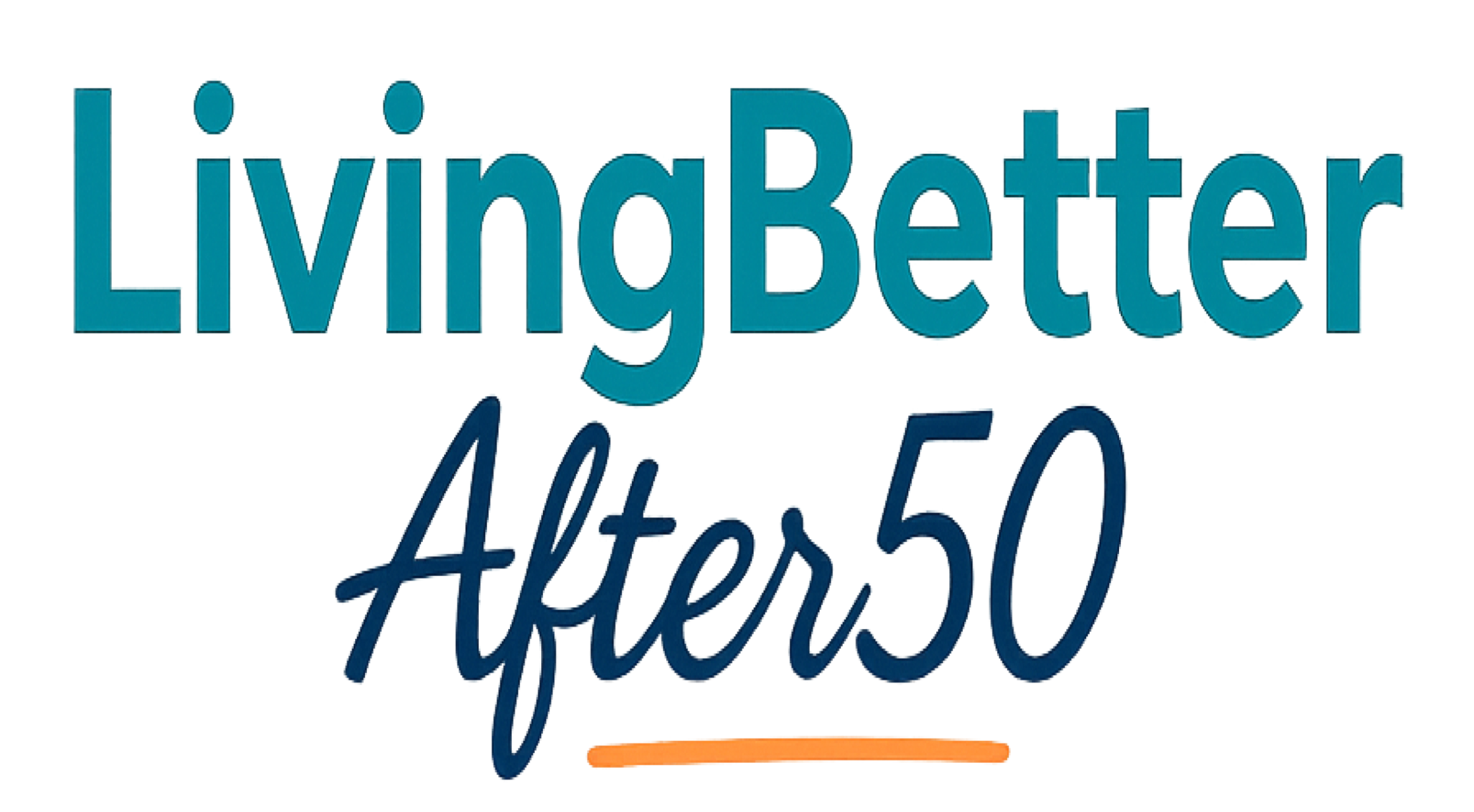You wake up one morning, pour that first glorious cup of coffee and scroll past another headline about a 22-year-old “founder” who just sold his app for eight figures.
Cue the inner eye-roll.
Because somewhere between paying bills, raising kids, and keeping your back from staging a full-blown protest, you started wondering;
“Wait… is it too late for me to do something new?”
Short answer? Nope. Not even close.
In fact, the numbers say this might be the perfect time. Studies from MIT and the Kauffman Foundation show that people in their 50s are nearly twice as likely to build a successful business as those in their 30s.
Yeah… let that sink in while you sip.
Why? Because experience is rocket fuel. You’ve got decades of know-how, battle scars, and problem-solving chops that no 20-something with a ring light can match.
This stage of life isn’t about starting over. It’s about starting smarter. Call it your second act. That sweet spot where purpose finally meets freedom.
So whether you’ve been daydreaming about launching a side hustle, turning your hobby into income, or building something that leaves a legacy… this is your moment.
Because 50 isn’t “over the hill.” It’s standing at the top, looking out over everything ahead and realizing you’ve finally got the blueprint to conquer the world.
So, lets start by tackling…
The Great Myth of “Too Old to Start”

We all grew up thinking that hitting 50 meant you were basically auditioning for a retirement commercial.
I mean, remember those old TV shows? The “older” characters were always sitting in rocking chairs, knitting sweaters, or talking about early bird specials.
They made midlife look like a waiting room for the end credits. That was the script we were handed and sadly many of us believed it.
We thought big dreams came with an expiration date. Like ambition had a “best if used by” sticker slapped on it somewhere in our 40s. But that was always nonsense.
Some of the biggest names in business didn’t even get started until midlife:
- Ray Kroc was in his 50s when he turned a small burger stand into McDonald’s.
- Colonel Sanders was in his 60s when he finally perfected his secret recipe.
- Vera Wang didn’t design her first wedding dress until she was 40.
- Stan Lee was still creating superheroes in his 50s and beyond.
- Martha Stewart built her empire after raising kids.
The truth is, most of us just needed time—to figure out what we care about, collect some battle scars, and realize stability isn’t the same thing as fulfillment.
Why Age Is Actually Your Superpower

Here’s something Millennials and the Gen Z generation won’t like to hear: youth is NOT everything.
Sure, twenty-somethings have energy and optimism.
But experience? Wisdom? Patience?
That is game-changing.
In fact, a massive MIT study looked at more than two million entrepreneurs and found something surprising: the average successful founder was 42.
And founders in their 50’s were nearly twice as likely to build a successful company as someone in their 30s.
That’s not luck. That’s leverage.
The Second-Act Movement

Millions of people in their 50s, 60s, and even 70s are flipping the script on “aging”.
They’re not slowing down. They’re reinventing.
It’s not about chasing a paycheck anymore. It’s about meaning. Purpose. Freedom.
Teachers are starting tutoring businesses. Nurses are becoming wellness coaches.
Engineers are launching consulting firms. Artists are selling their work instead of hiding it away.
Here’s some hot paths many over-50 founders are choosing:
- Education & Mentorship: Teach, coach, train, or guide.
- Consulting & Entrepreneurship: Turn deep experience into a service or online business.
- Health & Wellness: From yoga to nutrition to caregiving.
- Creative Arts: Writing, painting, photography, crafts.
- Sustainability & Nonprofits: Make a difference locally or globally.
This isn’t reinvention for the sake of change.
It’s integration—bringing your skills, stories, and scars to something that matters.
Challenges You’ll Face (and How to Beat Them)

Starting after 50 comes with a few curveballs. Ageism. Tech overwhelm. Money fears. Self-doubt.
Look, you are NOT just imagining it—many feel the same.
The upside? Older entrepreneurs are thriving anyway.
Here’s how to tackle the big four:
- Ageism. Own your expertise. Lead with proof and results. Confidence makes the birth year irrelevant.
- Tech skills. You don’t need every app—just the ones that matter. Learn on demand. YouTube is your friend.
- Money fears. Start lean. Cut overhead. Test before you go all-in. Side hustles count.
- Self-doubt. That inner critic is loudest before a breakthrough. Act anyway.
And get support. SCORE and AARP’s Work for Yourself @50+ offer free mentoring, workshops, and advice built for this stage.
Your Second-Act Startup Blueprint

You don’t need a 40-page business plan or a Shark Tank pitch. You need a simple roadmap that keeps you moving.
- Find your spark. What do you love talking about? What do people always ask you to help with? Start there.
- Define the problem you solve. Be specific about who needs what you offer.
- Crunch the numbers. Keep overhead low. Use what you already have. Momentum over perfection.
- Keep learning. Courses, workshops, tutorials—stack small wins weekly.
- Start small. Test with a few customers. Gather feedback. Tweak. Repeat.
- Build your tribe. Mentors, local groups, online communities—don’t go solo.
- Handle the boring stuff. Talk to an accountant or local small-biz center. Get the basics right.
- Stay flexible. Let your idea evolve. Pivoting isn’t failure—it’s wisdom in motion.
Legacy and Meaning: The Real Why

By this stage, it’s not just about money.
It’s about meaning. Purpose. Impact.
Studies show many over-50 founders start for purpose, not profit. They want to create something their kids and grandkids can be proud of.
Help people. Give back.
Make beauty and put it into the world.
Your story inspires others.
Every time you step out of your comfort zone, you give someone else permission to do the same.
Your Encore Moment

The first act was learning the ropes.
The second act is playing by your own rules.
You’re not starting over—you’re starting exactly where you’re meant to be. If it still feels scary, remember: every great story has a little fear before the big moment.
That’s just energy in disguise.
You don’t need permission. You don’t need to know everything. You just need the next small step.
The second act isn’t a backup plan. It’s your encore.

